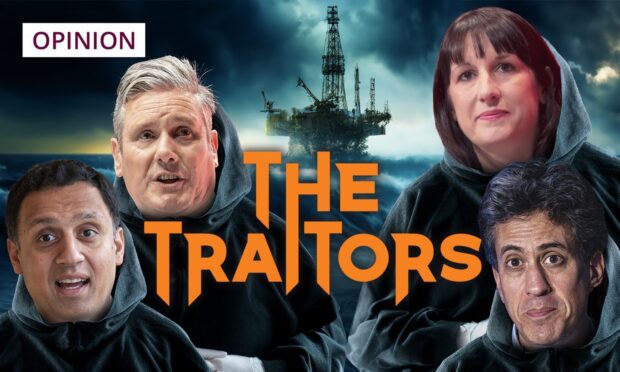Heading to the north of Scotland to betray people in the pursuit of money and power has become very fashionable in 2024, thanks to The Traitors.
However, the back-stabbing stars of the hit television series have nothing on the Labour Party, which, just months after heading north to promise “no cliff-edge end” to the North Sea oil and gas sector, has delivered one of the biggest betrayals in Britain’s industrial history.
The party’s “proper” windfall tax – which will result in energy firms being levied at 78% for another five years – will wipe out 100,000 jobs, according to analysts, and cost the Treasury £20 billion in lost revenue.
To put the devastating job toll in context, it was the axing of 20,000 jobs which sparked the miners’ strikes in 1984 and 1985. This one policy will potentially wipe out five times as many.
Even for a political party known to indulge in a bit of pre-election self-flagellation, this really takes the shortbread biscuit. Labour – the party of workers and unions – is happy to cast tens of thousands of hard-working men and women on the scrapheap, and place a world class Scottish industry on death row.
It does not matter what your political persuasion is: a policy which costs 100,000 jobs is a bad one.
Energy policy has become shambolic
The fact that opposition parties cannot make political capital out of such a ruinous strategy highlights just how shambolic energy policy has become on these isles.
The SNP of old would be standing up for the tens of thousands of Scots now facing an uncertain future. The prospect of a Westminster government shutting down Scotland’s biggest industry would be election manna from heaven.
However, hamstrung by the SNP’s ill-conceived presumption against oil and gas, and politically neutered by the Greens, Humza Yousaf has no moral high ground to occupy on this issue.
Neither do the Conservatives, who implemented the windfall tax in the first place, and have since ignored multiple pleas to remove it, despite energy prices normalising over a year ago.
Based on the above, you can understand why the forthcoming general election has paralysed investment in the North Sea. But that paused investment will become lost investment if Labour wins on this policy platform.
UK could lose £40bn between now and 2030
When we welcomed Sir Keir Starmer and Ed Miliband to Aberdeen in November, they looked us in the eye and told us they wanted to work with the energy industry to deliver a transition that leaves nobody behind.
They say they want to work in partnership with industry. But, just like last summer, when they sprung plans for an exploration ban, this windfall tax extension has been done with zero engagement.
Going forward, the party’s policies must also reflect three key points: we need oil and gas, we need the people who produce it, and we need the companies who finance it
Right now, Labour’s energy policy is an absolute disaster, and the party needs to sit down with industry and rewrite it from scratch if we are to retain any hope of remaining a global energy hub. As things stand, the UK is set to lose out on £40 billion worth of investment between now and 2030.
Going forward, the party’s policies must also reflect three key points: we need oil and gas, we need the people who produce it, and we need the companies who finance it.
Oil and gas will still be 20% of our energy mix in 2050 and a net-zero scenario. And we need new fields to offset decline, otherwise we will lose 75% of our production inside a decade, leaving us reliant on more energy imports from abroad, as well as potential energy shortages.
Labour has to prove it can be trusted
This is also about people – if you wind down the North Sea too quickly, before jobs and opportunities are available at scale in the renewables sector, then you lose the world-class workforce and supply chain. That would make what is already an enormous challenge even harder, perhaps impossible. We cannot allow it to happen.
And, finally, you need energy companies to have faith in order to invest in the long-term future of the UK. That means working in lockstep with many of the firms currently producing oil and gas, because they are the ones which will lay out the huge sums required to commercialise new technologies.
If Labour wants to win power, the party needs to prove to industry – and the public – that it can be trusted with our energy transition. The early signs are not good, and if we get this wrong, the economic and social damage will be enormous.
Ahead of the 1992 general election, there was a famous front-page headline which urged the last person to leave Britain to “please turn out the lights” if Labour won the election.
This time around, the lights may go out by themselves.
Ryan Crighton is policy director at Aberdeen & Grampian Chamber of Commerce



Conversation